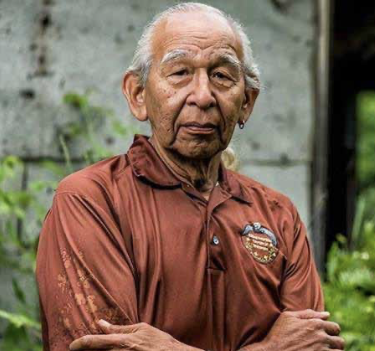Indigenous Peoples’ Day (Oct. 13)
Hocąk: Language Is Our Culture: Andrew Thundercloud

UW-Platteville Communications photo
“Language is our culture.” This phrase was stated multiple times by a man who gave us his time to not only share his insight on what that phrase means to him, but also to tell us about himself and how he takes the phrase to heart.
Andrew Thundercloud was a guest speaker on Oct. 13, and he told stories of his life, from when he was a young boy forced to be sent out to school to when he became a young man and was sent out to fight in the Vietnam War. “Language is our culture,” is a phrase that should be shared with everyone.
Ho-Chunk was the first language that Thundercloud ever learned. This was taught to him by his grandfather, and it was the only language he heard early on in his childhood. The people around Thundercloud did not speak any English, and for a while Ho-Chunk was all he heard. Thundercloud tells us a story about the first time he saw a white man, who came looking for his grandfather and spoke Ho-Chunk.
At that time, he was taken aback. The white man came looking for his grandfather to talk about land ownership. Thundercloud later learned that the white gentleman who arrived that day was a preacher whom he believed to be part of the Dutch Reform Church. The Church used to have a school in Neillsville where many children went.
It was specifically a school where Native American children were sent to be reformed. They were not allowed to speak their native tongue and were expected to speak English. Thundercloud recalled a time when he talked to one of his friends in Ho-Chunk, and one of his teachers overheard him speaking with his friend so he was spanked in the boiler room as punishment. It was the first time he was physically reprimanded.
Upon hearing about this on a visit to come see Thundercloud, his parents took him out of school. He was later sent out to an “an all-white school,” as he put it. He stated that he admired his first-grade teacher and that her biggest accomplishment was teaching him English.
Thundercloud said that because of his teacher being able to teach him English, he was able to not only graduate from high school but to also go to UW-Madison and get his degree. Afterwards, he joined the Navy and served for six years. During that time he learned Vietnamese.
He said any time he spoke the language while overseas, native speakers would laugh at him. He never understood why until he asked a friend of his and his friend answered back, “The way that you speak Vietnamese is the way they speak it up north.” Thundercloud’s Vietnamese was a more formal way of speaking the language.
Thundercloud told the interesting story of the creation of man. Thundercloud said God created man and tried to speak with him, but man could not answer him due to many physical limitations, from having no ears to having no tongue. God gave him everything he needed to speak back. As Thundercloud put it, “It is said that they were speaking Ho-Chunk.” There are a few translations on what Ho-Chunk means, and the translation that he accepts is “ho wakan chunk,” or “the holy voice.” He discussed how the languages and the other tribes of Native Americans had branched from the Ho-Chunk. Thundercloud told listeners what phrases meant to him, such as stating your ethnicity. He believed that you cannot call yourself a nationality until you have learned their language, such as being Ho-Chunk and knowing the language. He believed that learning a language is more than just being able to communicate. It also means you know how to be part of the culture. After his speech, Thundercloud opened the floor to questions. There were a couple of nice questions, such as “Do you find it disrespectful if non-Ho-Chunk people learn your language and your culture and to practice it?” Thundercloud’s response to this was positive. He stated “If they truly want to learn a culture, I am in favor of it.”
“Language is our culture.” Thundercloud really gave listeners food for thought by the end of his speech. It is something that we should all think about when we want to pick up a new language. Why do we want to speak it? We should answer this to the best of our abilities and be able to learn not only how to communicate with others but have some insight on what makes the language unique to a group of people.



